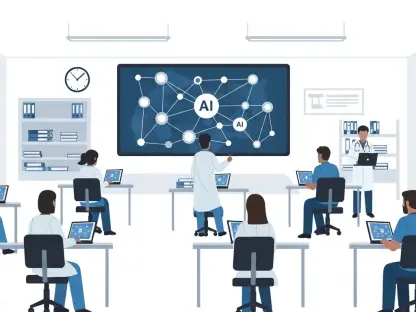In the rapidly evolving field of healthcare technology, Faisal Zain stands at the forefront of innovation. With his expertise in the manufacturing of medical devices and a deep understanding of AI advancements, Zain provides a unique perspective on how AI is reshaping the healthcare landscape to foster a more patient-focused experience.
Can you explain the concept of “The new UI is no UI™” and how it applies to healthcare technology?
The idea that “The new UI is no UI™” is revolutionary in healthcare tech. It’s about moving away from traditional, complex interfaces with screens and buttons. Instead, technology should work invisibly in the background, allowing healthcare providers to focus entirely on their patients. By minimizing manual input and maximizing AI’s capabilities to listen, learn, and act, the end goal is to create a seamless experience that is intuitive and effortless for users.
How does AI agentification differ from traditional software models in healthcare?
AI agentification represents a notable departure from standard software models, which typically require users to follow a set, linear workflow. Traditional software executes commands while AI agents perform autonomously, understanding context and anticipating user needs. This proactive approach allows AI agents to not just process commands but also to assist in more sophisticated ways, adapting to each provider’s style and enabling a more flexible and dynamic interaction.
What are some of the key limitations of current EHR systems that AI agentification aims to address?
Current EHR systems are often rigid and force clinicians to adapt their workflows to fit predefined templates, which can be incredibly frustrating. They require excessive data entry, which detracts from patient care. AI agentification aims to address these limitations by transforming these systems into adaptive, intelligent platforms. It reduces the documentation burden and provides meaningful insights, allowing clinicians to spend more time with patients rather than on administrative tasks.
In what ways can AI agents act autonomously to assist healthcare providers?
AI agents can autonomously handle a wide range of tasks, such as reviewing patient history before a visit, generating summaries, and even anticipating follow-up needs. During patient encounters, they can verify information and assist with complex documentation tasks, freeing up providers to focus on patient interaction. This autonomy not only enhances efficiency but also improves the accuracy and thoroughness of medical record-keeping.
How are AI agents leveraging technologies like natural language processing and adaptive learning?
Natural language processing (NLP) allows AI agents to understand and process human language, making interactions more natural and intuitive for healthcare providers. By incorporating adaptive learning, these agents continually refine their understanding of workflows and preferences. This combination equips AI agents to not only handle tasks like data entry through voice commands but to also develop insights that can improve patient outcomes over time.
Can you provide examples of how AI agents are already transforming pre-visit, during visit, and post-visit workflows?
AI agents are making significant impacts across all stages of the patient care process. Before visits, they prepare comprehensive summaries of patient information, which helps practitioners in planning the consultation. During visits, they actively participate by capturing important details and even aid in decision-making. After the visit, they ensure that documentation is complete, manage follow-up appointments, and facilitate continued patient communication, streamlining what used to be cumbersome processes.
How do AI agents make the documentation process more efficient for healthcare providers?
AI agents simplify the documentation process by using voice-driven inputs rather than traditional typing methods. They can automatically generate encounter notes and summaries, reducing the time clinicians spend on clerical work. This automation not only speeds up processes but also minimizes the risk of human error, ensuring more accurate and detailed medical records.
What specific tasks can AI agents automate to reduce the clerical burden on clinicians?
AI agents can automate numerous tasks, such as coding and billing, which traditionally demand meticulous manual entry and review. By determining accurate billing codes and generating claims automatically, they significantly reduce the workload on clinicians. This allows healthcare professionals to devote more energy to direct patient care and less on administrative duties that were previously time-consuming.
How does AI agentification support unique clinical workflows rather than imposing a single method on providers?
AI agentification acknowledges that each clinician has their preferred methods of operating. It allows systems to adapt to individual workflows rather than imposing a universal approach. This flexibility means that whether a provider prefers documenting during or after patient interactions, the system can accommodate these choices, providing a supportive environment that enhances rather than hinders medical practice.
What are the benefits of a modular approach in EHR systems enabled by AI agentification?
A modular approach offers significant advantages by allowing different components of EHR systems to work in harmony without being constrained by a rigid structure. This enables a customized experience for healthcare providers, with AI agents seamlessly integrating various functionalities based on specific needs. This leads to a more effective and efficient system that aligns closely with actual clinical workflows.
Can you share some feedback or testimonials from providers using NextGen® Ambient Assist?
Healthcare providers have expressed how transformative NextGen® Ambient Assist has been, emphasizing its impact in reclaiming time and reducing burnout. Many report that it has brought joy back into their practice by minimizing the mundane aspects of their jobs, allowing them to reconnect with the core values of patient care.
How has the adoption of health AI surged recently, and what factors are contributing to this increase?
The adoption of health AI has seen a remarkable surge, with more providers recognizing its potential in improving efficiency and patient care outcomes. Key factors include increased familiarity with AI technologies, evidence of its effectiveness in real-world applications, and a growing necessity to manage the mounting clinical and administrative demands placed on healthcare systems.
What key principles should healthcare organizations keep in mind when integrating AI into their systems?
Healthcare organizations should focus on integration that prioritizes tangible clinical outcomes over the novelty of technology. Effective change management is crucial, ensuring users see real benefits. Rapid innovation is important, but careful evaluation must guide decisions. Integration should be seamless, not isolated, to create a cohesive technology ecosystem that enhances the overall healthcare process.
Why is change management crucial in the successful adoption of AI in healthcare?
Change management is vital because it smooths the transition process and ensures that providers can adapt comfortably to new technologies. It involves educating staff about the benefits, providing the necessary training, and supporting them through the adjustment period. This comprehensive approach helps mitigate resistance and promotes a positive reception of AI, ultimately leading to more successful implementation.
What role does integration play in ensuring the success of AI solutions in healthcare technology?
Effective integration ensures that AI solutions work harmoniously within existing healthcare frameworks, enhancing capabilities rather than causing disruptions. It’s crucial because discrete solutions that operate in silos can fail to deliver comprehensive benefits. Successful integration means that AI augments the healthcare system, creating a seamless and invaluable support tool for clinicians.
How does AI agentification contribute to restoring the human connection in healthcare?
AI agentification restores the human connection by minimizing administrative burdens that detract from patient care. By tackling tasks that normally require manual attention, AI allows physicians to dedicate more of their time to engaging directly with patients. This shift not only improves the quality of care but also reinforces the personal interactions that are at the heart of effective healthcare.
Looking ahead, what future trends do you foresee in AI’s role in healthcare technology?
Looking forward, AI in healthcare will continue to evolve, focusing on becoming even more intuitive and patient-centered. We can expect the integration of more advanced analytics for personalized care, greater predictive capabilities in disease prevention, and more refined automation of repetitive tasks. Ultimately, AI will play a critical role in creating a more adaptive, responsive, and humane healthcare system.









